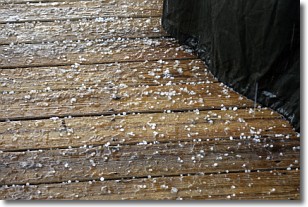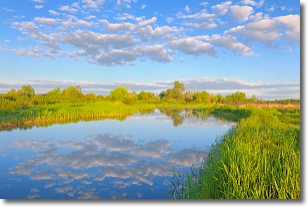Weather Alert in New Mexico
Flood Advisory issued June 30 at 5:19PM MDT until June 30 at 7:15PM MDT by NWS Albuquerque NM
AREAS AFFECTED: Cibola, NM
DESCRIPTION: * WHAT...Arroyo and small stream flooding caused by excessive rainfall is expected. * WHERE...A portion of west central New Mexico, including the following county, southeastern Cibola. * WHEN...Until 715 PM MDT. * IMPACTS...Minor flooding in low-lying and poor drainage areas. Rises in small streams and normally dry arroyos. Dangerous flows over low-water crossings. Water over roadways. Overflowing poor drainage areas. Some low-water crossings may become impassable. * ADDITIONAL DETAILS... - At 516 PM MDT, Doppler radar indicated heavy rain due to thunderstorms. This will cause arroyo and small stream flooding. Up to 2.5 inches of rain have fallen. - Additional rainfall amounts up to 1.0 inch are expected over the area. The potential existss for flash flooding to develop. - Some locations that will experience flooding include... Acoma Pueblo, Skyline-Ganipa and Acomita Lake. - Hazardous water levels are expected in Acoma Creek and Cannon Largo. - http://www.weather.gov/safety/flood
INSTRUCTION: Turn around, don't drown when encountering flooded roads. Most flood deaths occur in vehicles. Both localized and distant heavy rainfall will create sudden and dangerous flows in arroyos and over low water crossings.
Want more detail? Get the Complete 7 Day and Night Detailed Forecast!
Current U.S. National Radar--Current
The Current National Weather Radar is shown below with a UTC Time (subtract 5 hours from UTC to get Eastern Time).

National Weather Forecast--Current
The Current National Weather Forecast and National Weather Map are shown below.

National Weather Forecast for Tomorrow
Tomorrow National Weather Forecast and Tomorrow National Weather Map are show below.

North America Water Vapor (Moisture)
This map shows recent moisture content over North America. Bright and colored areas show high moisture (ie, clouds); brown indicates very little moisture present; black indicates no moisture.

Weather Topic: What is Sleet?
Home - Education - Precipitation - Sleet
 Next Topic: Snow
Next Topic: Snow
Sleet is a form of precipitation in which small ice pellets are the primary
components. These ice pellets are smaller and more translucent than hailstones,
and harder than graupel. Sleet is caused by specific atmospheric conditions and
therefore typically doesn't last for extended periods of time.
The condition which leads to sleet formation requires a warmer body of air to be
wedged in between two sub-freezing bodies of air. When snow falls through a warmer
layer of air it melts, and as it falls through the next sub-freezing body of air
it freezes again, forming ice pellets known as sleet. In some cases, water
droplets don't have time to freeze before reaching the surface and the result is
freezing rain.
Next Topic: Snow
Weather Topic: What are Stratocumulus Clouds?
Home - Education - Cloud Types - Stratocumulus Clouds
 Next Topic: Stratus Clouds
Next Topic: Stratus Clouds
Stratocumulus clouds are similar to altocumulus clouds in their
fluffy appearance, but have a slightly darker shade due to their additional mass.
A good way to distinguish the two cloud types is to hold your hand out and measure
the size of an individual cloud; if it is the size of your thumb it is generally
an altocumulus cloud, if it is the size of your hand it is generally a
stratocumulus cloud.
It is uncommon for stratocumulus clouds to produce precipitation, but if they do
it is usually a light rain or snow.
Next Topic: Stratus Clouds
Current conditions powered by WeatherAPI.com




